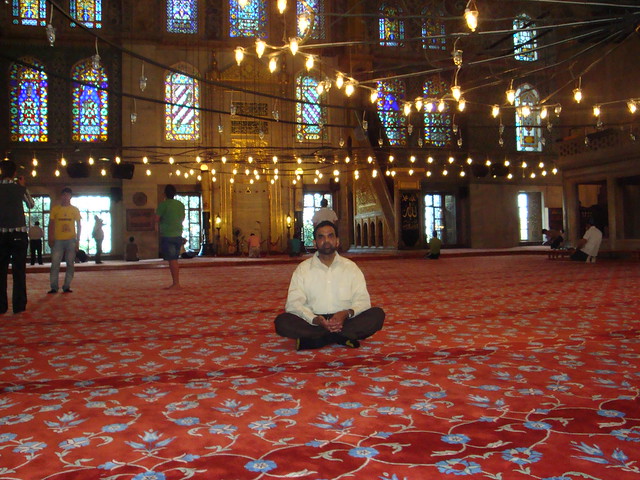Turkey-Pakistan Relations: A Transformational View (Part-1)
-DR. ABDUL RUFF
____________

[interior of the Dome of Hagia Sofia]
Before taking up the issues confronting the
Since 2 April 1954 when Pakistan and Turkey signed a treaty of friendship and cooperation, bilateral ties have maintained a sustained improvement. Turkey established diplomatic relations soon after the independence of Pakistan in 1947. Bilateral relations became increasingly close important owing to cultural, religious and geopolitical links between the two countries.
Historically, based on the Western-inspired reforms of Mustafa, such policies have placed heavy emphasis on Turkey's relationship with the Western world, especially in relation to the USA, the NATO and the EU. Pakistan, a former "strong" ally of USA in attacks on Muslims in Pakistan and
Turkey, on the other hand, is a owner of NATO and has recently angered fascist Israel, a secret terror ally of USA-UK terror twins in Mideast over the continued Gaza terror blockade, but has not done anything to damage
Relations between Pakistan and Turkey, notwithstanding their varying levels of development and importance, are exemplary. The people of both countries have brotherly relations which date back centuries.
The disintegration of the mighty Soviet Union transformed the political and security structure of the world, prevalent since the end of the Second World War. In the cold war era, which lasted more than four decades, Pakistan and Turkey were both frontline states against Soviet expansion. But, with the end of cold war both Turkey and Pakistan felt vulnerable and insecure in the unfamiliar international political and security environment.
The post-Cold War period has seen a diversification of relations, with Turkey seeking to strengthen its regional presence in the Balkans, the Middle East and the Caucasus, as well as its historical goal of EU membership. Under the AK Party government, Turkey's influence has grown in the Middle East based on the strategic depth doctrine, also called Neo-Ottomanism.
The Muslim population of South Asian subcontinent had centuries old cordial ties with the brotherly people of Turkey. Accordingly, Pakistan and Turkey have always remained close friends. Both countries are aligned in the Organization of Islamic Conference (OIC), founded in 1967 to increase cooperation in social, economic, cultural, scientific and political areas; uphold international peace and security; and advance education. Both are countries with large Muslim populations, for cooperating in economic and humanitarian development.
End of cold war gave rise to total detente between ideologically antagonistic USA and Russia. Birth of Muslim nations in Central Asia brought Pakistan and Turkey together as important Islamic nations. Turkey and Pakistan retained their geo-political importance in the post cold war world, though they began looking for new roles and new foreign policy approaches. Both Turkey and Pakistan, valued as important states in their regions, joined the US-led Central Treaty Organization (CENTO) aimed to bolster military and strategic cooperation and counter the spread of communism and Soviet influence in the region. This military bond enhanced the Pakistan military might.
Turkey and Pakistan are founding members of the Economic Cooperation Organization and part of the Developing 8 Countries (D-8) organization. Both nations have worked to negotiate a preferential trading agreement, aiming to considerably increase trade and investments, especially in transport, telecommunications, manufacturing, tourism and other industries. Both governments sought to increase the volume of bilateral trade from $690 million to more than $1 billion by 2010.
That Turkey and Pakistan were part of Cold War alliance called the Central Treaty Organization enabled Pakistan to gain a lot from both Turkey and other NATPO members.
This obviously is also the root cause for the down fall of Pakistan in recent years with an illegal NATO invasion, destabilization of Pakistan by USA on fake Osama gimmick.
--------
Dr. Abdul Ruff, Specialist on State Terrorism; Educationalist;Chancellor-

[Inside Sultan Ahmet Mosque (Blue Mosque), showing the famous Iznik tile work, and chandeliers]
د. عبد راف













